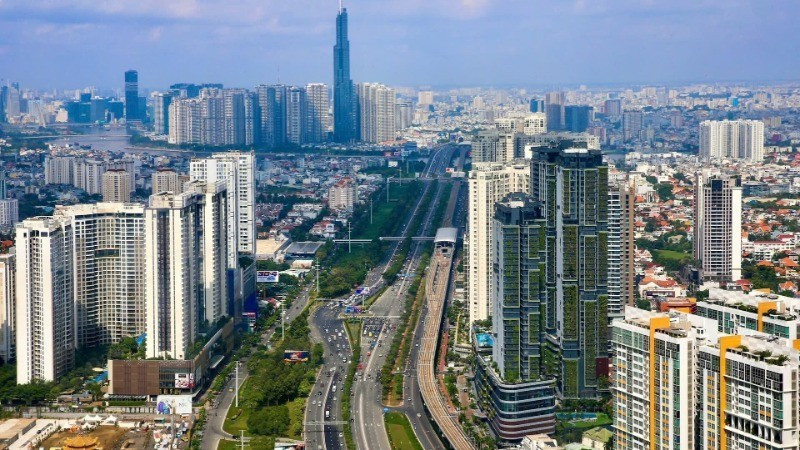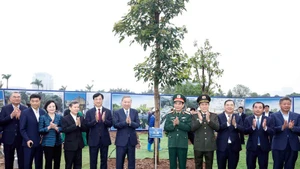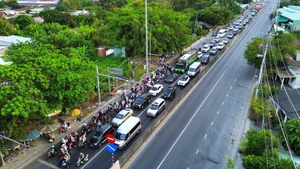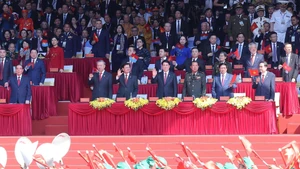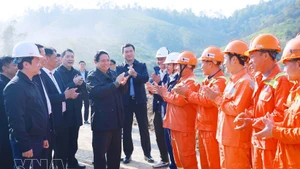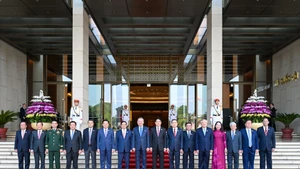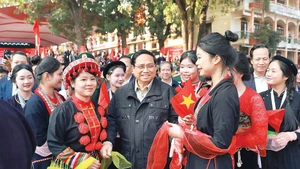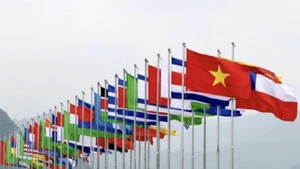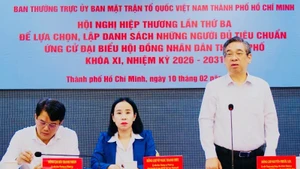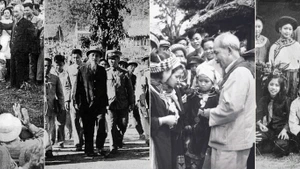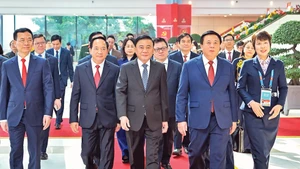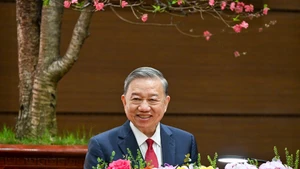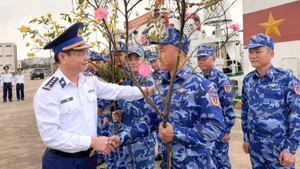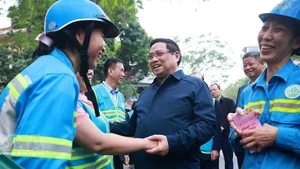The event marks a new administrative entity of the Socialist Republic of Viet Nam with a particularly great strategic stature, designed for both the present and the future, with a new long-term and sustainable development space model.
General Secretary To Lam, in his message to compatriots and soldiers nationwide on this important occasion, pointed out: The decision to "rearrange the nation" is a historic step of strategic significance, marking a new stage of development in the cause of perfecting the state administrative apparatus, perfecting the institutions and organisation of the political system in a synchronous, streamlined, effective and efficient manner, towards perfecting a modern, constructive, people-friendly, and people-serving administrative system under which all benefits belong to the people.
Today's historic decision demonstrates the stature of the Party's strategic thinking, directed by the National Assembly and the government, to be implemented firmly, thoroughly, scientifically, and dialectically, with Vietnamese history, culture, and reality, while referring to international experience. Issues are studied and considered from many perspectives, in terms of thinking, vision, development strategy, organisation, force, ideology, and social psychology liberation. It is also considered from geographic, geopolitical, geoeconomic, and cultural dimensions to national defence and security, which is placed in the overall development space of the country, harmoniously combining the criteria of population size, natural area, historical traditions, national culture, religion, beliefs, compatible factors, and related science to carry out the revolutionary arrangement.
Looking back at the 95-year revolutionary cause under the leadership of the Party, 80 years of the Democratic Republic of Viet Nam and the Socialist Republic of Viet Nam, and the achievements of 40 years of innovation, the three-level local governance model has successfully completed its historical mission. Today, the country has achieved great achievements, firmly entering the new era with the objective and inevitable requirements of the country's development cause in the context of globalisation, digital transformation and the fourth industrial revolution.
In that historical process, we pay deep tribute to the previous generations of leaders of the Party, state, National Assembly, government, and the Viet Nam Fatherland Front, which have led and directed with wisdom, intelligence, courage, enthusiasm, dedication, sacrifice, and dedication to the cause of national development. Generations of cadres, party members, soldiers of the armed forces, civil servants, public employees, employees, people of all walks of life as well as each agency and local government, especially district-level administrative units, have shouldered great responsibilities to excellently and completely fulfil their glorious historical mission over the past eight decades, creating a solid foundation for the country to build and perfect the new two-level local administrative system as well as ensuring all conditions for the new model to operate smoothly and effectively.
The rearrangement of administrative boundaries and the operation of a new local governance model are not only administrative events, but also strategic changes. It is an inevitable objective requirement of the people and the country in the journey to build dynamic development zones of the country and the region, worthy of the aspiration for "a strong Viet Nam by 2045". The two-level local governance model not only eliminates the intermediate level, but more importantly, it reorganises the space for sustainable development such that the government is close to the people, for the people, and serves the people better, and all benefits belong to the people. The central agency also clearly defines the authority and gives more initiative to local authorities so that each locality is dynamic, creative, and develops in accordance their reality.
This new development space is being shaped with a long-term vision aimed at synchronous, sustainable, and scientific growth. However, this is only the initial step. The streamlining of the political system's apparatus and the rearrangement of administrative units at all levels also has an impact on the thinking of a number of cadres, party members, civil servants, public employees, and employees as well as the psychology, cultural differences, customs, and traditional place names deeply rooted in local communities. These changes demand fairness, consensus, strong political determination, and especially the sacrifice of personal interests; if there is a lack of solidarity and unity, the implementation process could encounter problems and shortcomings.
More than ever, national interests must be placed above all else. The ultimate goal must be the future development of the nation. This mindset requires each official, Party member, agency, and locality to transcend parochial interests, narrow perspectives, and outdated habits that may have once been valid but are no longer suited to current demands.
We are entering the stage of organising Party congresses at all levels towards the 14th National Party Congress, preparing for the election of deputies to the 16th National Assembly and people's councils at all levels for the 2026-2031 term. Each locality will have to demonstrate a new vision and strong desire. Personnel remain the decisive factor for all success or failure. Therefore, special attention must be paid to building a team of cadres with integrity, intellect, and courage — those who dare to act, dare to take responsibility, and are assessed based on practical competence, professional ethics, and prestige among the people.
Most recently, in the article "The power of solidarity", General Secretary To Lam affirmed that solidarity in the entire political system is the key to the success of this reform. There needs to be close coordination between central agencies and local authorities to promptly remove difficulties. The consensus of cadres, civil servants and people will create a stable foundation for effective implementation of the new model. The requirement of "unanimity from top to bottom, and smooth operation across the entire political system" has never been as important as it is now.
At the 9th session of the 15th National Assembly, many delegates emphasised: "Rearranging the country" is a historic opportunity but also a challenge. Success does not only come from documents or resolutions, but must come from consensus among the people, determination in leadership and dedication in task performance. Administrative reform is not a destination, but the beginning of a new mindset, a strategic vision. The joint efforts, unanimity, and solidarity to make “every working day is a day of creation” — as expressed by General Secretary To Lam — form the core strength and spiritual foundation that underpins the resolve to operate the two-tier local governance model effectively, for the happiness and wellbeing of the people.
Up to this point, “our team is in order, our ranks are straight”, the whole nation is marching together towards the bright future of the country, for the happiness of the people and for a sustainable, prosperous, and developed Viet Nam!
